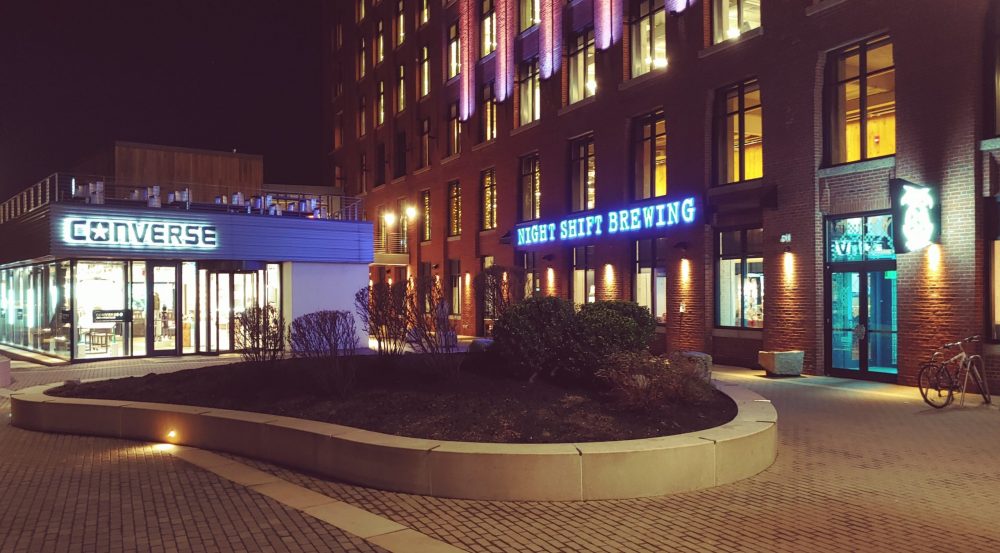“I think people will want to continue to support local, but consumer confidence is obviously also taking a hit.”
As governors across America have implemented lockdowns of varying magnitudes in the wake of the COVID-19 outbreak, essential businesses have been given the go-ahead to operate. What ‘essential’ actually means, of course, has varied state by state. But nationwide, alongside healthcare, grocery stores, gas stations, and pharmacies, liquor stores have been one industry to weather closures seemingly nationwide.
In the last couple weeks, booze buying has surged. In Colorado, the rush on liquor stores was so hectic after the governor ordered them closed, it only took three hours before he reversed his decision. While it’s true beer has seen a 42 percent jump in sales recently, though, breweries, like everything else, have been hit hard.
Tap rooms have been shut down, while businesses have had to adapt to a lack of foot traffic and extended stays. Many have embraced curbside pick-up and delivery, but that’s only produced a fraction of what many local operations need to continue. The trickle down effect has left hundreds of bartenders and servers furloughed or laid off throughout the Greater Boston area. According to local brewery owners and operators, the fight to survive is on.
In an interview, Night Shift co-founder Michael Oxton said the uncertainty of everything has been the worst part of the coronavirus pandemic. In the past few years, Night Shift has made some big moves, opening up a taproom on Lovejoy Wharf in Boston and unveiling plans for a massive brewery outpost in Philadelphia. Now, Oxton said, they’ve had to furlough between 85 and 90 percent of their staff.
“We’re planning everything on a day-to-day basis,” Oxton said. “It’s too hard to predict what will happen because it keeps changing and evolving and maybe that’s the scariest part of all this.”
Like many businesses, Night Shift didn’t predict business shutting down so quickly, and have had to scramble to adjust to the new normal. In the first week alone, Oxton said, Night Shift furloughed 75 percent of their workers. Hardest hit was their Lovejoy Wharf location, which saw a steep drop-off in traffic. When it became clear that the location wasn’t sustainable last week, it was closed.
“In the last week alone we’ve had to cut staff even further,” Oxton said. “We’ve been talking to employees about how to file for unemployment, but we’re keeping everyone on health insurance to make sure people can get their medical care covered. People know it’s nothing personal and they’ve been understanding. This sucks, but we’re all in the same situation together.”
At their Everett location, Night Shift, like many breweries, has started to shift to online and phone orders, providing curbside pick-up for customers. Oxton said even though the retail end is doing well, it’s only a fraction of the business they usually see. In the meantime, retail distribution has kept Night Shift afloat. In addition to shuttling their own beer around the northeast, they’ve been the main channel for many local craft breweries who use them for distribution.
 At Aeronaut in Somerville, production has slowed down significantly. According to Communications Manager Lee Hatfield, the company went from brewing two batches of beer a day five days a week and offering kegs all over the state, to making a complete switch to canned beer. In addition, Aeronaut launched an online store on March 14, just days before the state required breweries to close their taprooms.
At Aeronaut in Somerville, production has slowed down significantly. According to Communications Manager Lee Hatfield, the company went from brewing two batches of beer a day five days a week and offering kegs all over the state, to making a complete switch to canned beer. In addition, Aeronaut launched an online store on March 14, just days before the state required breweries to close their taprooms.
“We’ve had to pivot our production, sales, and marketing to 100% canned beer within 24 hours,” Hatfield said. “We basically have to can everything we brew. We are now brewing less beer, but more of our beer will be accessible to the public both in and outside Somerville. We’re still brewing our flagships, but this also forces us to get outside of our comfort zone and can some brands we haven’t had before.”
Behind the scenes, Hatfield said, Aeronaut’s departmental directors, who are salaried and working remotely, have been key to helping keep things running smoothly despite changes that have been made to their day-to-days. On the production end, Aeronaut has implemented new safety precautions including eliminating overlapping brew shifts, suspending on-site r&d projects, and restricting parts of the building to single staff members so that they can follow social distancing measures. Hatfield said all Aeronaut employees (full time, part time, service, salary) remain employed by the company, and that every employee is receiving full pay for what their normal average pay would look like.
“Many employees are working half the hours they usually would or perhaps none at all, but we are continuing to pay folks for what their normal weekly hours would look like. We are also continuing health benefits for all enrolled employees,” Hatfield said. “Our executive team has decided to not take pay, which is amazing, as they want to give our employees as much security as possible for as long as possible.”
Down the road from Aeronaut, Winter Hill Brewing Co. has had to deal with closing a restaurant while boosting beer sales. By mid-month, Winter Hill had transitioned to curbside pickup and online ordering, offering full meals like fried chicken, bbq, and sandwiches along with four-packs of their beer. But according to Winter Hill co-owner Breck Bailey, it hasn’t been enough to save every job.
The newest kid on the block between Night Shift and Aeronaut, Winter Hill only started selling cans of beer a couple years ago. At first, they only offered a few small menu items alongside small-batch brews. In the last two years, they’ve even contracted some offerings through Dorchester Brewing to satiate a growing demand for strong local beer. Since social distancing guidelines were implemented two weeks ago, Bailey said it has been brutal to make tough decisions about how to move forward as a small business.
“You try to make the best decisions with the information you have,” Bailey added. “It’s a difficult situation because you need to act very quickly while at the same time making thoughtful decisions that have a big impact on other people and your company’s ability to be successful long term. In many aspects, you need to largely ignore business fundamentals and feel comfortable that you’re making the best decisions for your community and employees.”
Winter Hill is currently running a prepared meal program three days a week out of its taproom, thanks in large part to a relatively new food service partner, Scott Brothers.
“It’s gotten a great response from the neighborhood, which is greatly appreciated and won’t soon be forgotten,” Bailey said. “We’re also servicing package stores to the extent they’re open and taking in inventory. As for the beer, overnight you had some of the bigger craft breweries in New England trying to move inventory through new distribution channels. I think people will want to continue to support local, but consumer confidence is obviously also taking a hit.”
Moving forward, both Bailey and Oxton said they’re unsure about what comes next. One thing is for certain, though—plans rolled out on the federal, state, and local levels to save small businesses are not enough. While Bailey said there’s an immediate need for unemployment claims and CARES Act distributions to get into individuals’ pockets as soon as possible, the PPP loan program needs some work.
“That’s as long as the underwriters have the tools to process applications quickly,” he said. “When we get to the point of reopening some of these businesses, particularly restaurants, it absolutely must be done in a measured way.”
Oxton said the big message, from small to midsize breweries, is that more assistance will be needed.
“This is unprecedented, and if we don’t see more help, people will be going out of business quickly,” he said. “It’s our customers who have been doing everything, supporting us by making online orders and doing pick-ups. We need more action from the government with cash and liquidity. The slower we act, the closer we edge toward the point of no return.”











